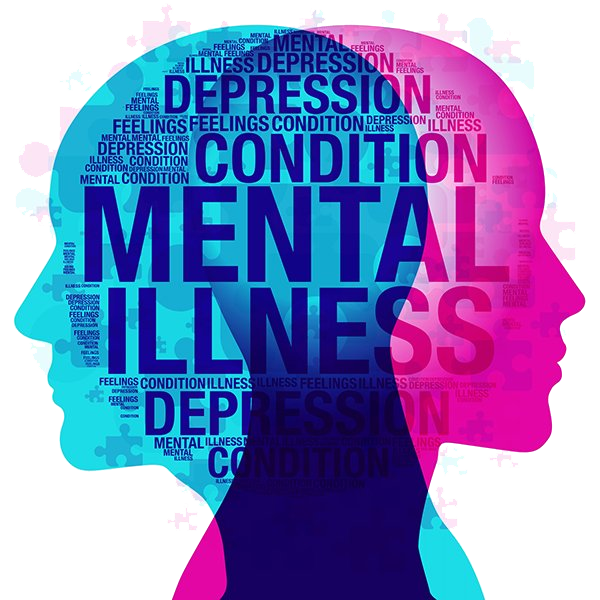Select Low mood Feelings of Guilt Suicidal thoughts, ideas or attempts Insomnia Lack of interest in work and activities and social interaction Decreased physical energy Fear (dark, stranger, being left alone, crowd etc) Difficulty in concentration Forgetfulness Pains and aches/stiffening/jerks Blurring of vision, hot and cold flushes, feelings of weakness Constant feeling of pain in any area of body without any physical illness Gastrointestinal issues Picking sensation Excessive Cleanliness Fear of Contamination Checking behavior Repeating rituals Recurrent or repetitive sexual thoughts Need for symmetry Hoarding tendencies Religious Preoccupations Emotional Withdrawal or detachment Delusions or any false belief without any rational background Hostility Suspiciousness Hearing voices or seeing images not seen or heard by others Disorientation Uncooperativeness Feelings of possession or thought control Poor Judgment Social Isolation Poor hygiene Alcohol or drug abuse A sense of desire or compulsion to take the substance Inability to terminate once started Physiological withdrawal affects Increased tolerance effect Lack of interest in other leisure time activities or hobbies Memory loss Confused/disoriented state Aggressive and violent behavior Elation or elevation in mood Over-talkativeness Increased physical energy Overspending Inflated sense of self worth Increased sexual urges Decreased need of sleep and appetite Impairments in reciprocal social interaction Lack of response to other people’s emotions Impairments in communication Poor flexibility in language expression Restrictive, repetitive, stereotyped patterns of behavior Rigidity in routine Fear/Phobias Eating disturbances Temper tantrums Self injury like wrist biting or banging of head Difficulty in understanding instructions Slow learners Difficulty in managing basic daily routine activities Delayed developmental milestones Excessive sensitiveness to setbacks and rebuffs Tendency to bear grudges Mistrustful nature and hostile tendencies Tendency to experience excessive self importance Unconcern for the feelings of others Very low tolerance Aggressive or antisocial personality Impulsive behavior Self harming tendencies Chronic feelings of emptiness Over concern with physical attractiveness Attention seeking behavior Manipulative behavior Feelings of excessive doubt and caution Very restricted eating patterns Distorted body image Tendency to purge using activities like vomiting, excessive exercising after eating Severe weight loss Binge eating Self esteem overly influenced by body weight Evidence of unpredictable or impulsive behavior Sudden change in life circumstances Constant feelings of hopelessness Panic state Sudden anxiety or agitation Intent or planning of suicide Difficulty in concentrating Memory loss Mood changes Mental decline Inability to recognize common things Jumbled speech Sleep disorders Restlessness/wandering or getting lost Unsteady walking or gait Inability to fall asleep Sleep walking Sleep terrors Nightmares Disturbed sleep wake schedule Loss of sexual desire Sexual aversion Erectile dysfunction Failure of genital response Orgasmic dysfunction Excessive sexual drive Pathological Gambling Fire Setting out of pleasure and impulse Pathological Stealing Pulling hairs from head Inattention Easily distracted Leaving the tasks incomplete Difficulty in sitting stable Indiscipline in almost all situations Interrupting work of others Tendency to finish task quickly without putting efforts Inappropriately running and climbing here and there Jerking movements Stiffness of body Loss of consciousness Loss of bowel or bladder control Rolling of eyes Tongue biting Pain Headaches Movement disorders Weakness Dizziness Fainting Abdominal Pain Bowel Problems Diarrhea Incontinence Constipation Significant memory loss of specific times, people and events Out of body experiences A sense of detachment from emotions Lack of a sense of self identity Feelings of possession Recurrent and unwanted distressing memories of the traumatic event Reliving the traumatic event (Flashbacks) Severe emotional distress
Select Low mood Feelings of Guilt Suicidal thoughts, ideas or attempts Insomnia Lack of interest in work and activities and social interaction Decreased physical energy Fear (dark, stranger, being left alone, crowd etc) Difficulty in concentration Forgetfulness Pains and aches/stiffening/jerks Blurring of vision, hot and cold flushes, feelings of weakness Constant feeling of pain in any area of body without any physical illness Gastrointestinal issues Picking sensation Excessive Cleanliness Fear of Contamination Checking behavior Repeating rituals Recurrent or repetitive sexual thoughts Need for symmetry Hoarding tendencies Religious Preoccupations Emotional Withdrawal or detachment Delusions or any false belief without any rational background Hostility Suspiciousness Hearing voices or seeing images not seen or heard by others Disorientation Uncooperativeness Feelings of possession or thought control Poor Judgment Social Isolation Poor hygiene Alcohol or drug abuse A sense of desire or compulsion to take the substance Inability to terminate once started Physiological withdrawal affects Increased tolerance effect Lack of interest in other leisure time activities or hobbies Memory loss Confused/disoriented state Aggressive and violent behavior Elation or elevation in mood Over-talkativeness Increased physical energy Overspending Inflated sense of self worth Increased sexual urges Decreased need of sleep and appetite Impairments in reciprocal social interaction Lack of response to other people’s emotions Impairments in communication Poor flexibility in language expression Restrictive, repetitive, stereotyped patterns of behavior Rigidity in routine Fear/Phobias Eating disturbances Temper tantrums Self injury like wrist biting or banging of head Difficulty in understanding instructions Slow learners Difficulty in managing basic daily routine activities Delayed developmental milestones Excessive sensitiveness to setbacks and rebuffs Tendency to bear grudges Mistrustful nature and hostile tendencies Tendency to experience excessive self importance Unconcern for the feelings of others Very low tolerance Aggressive or antisocial personality Impulsive behavior Self harming tendencies Chronic feelings of emptiness Over concern with physical attractiveness Attention seeking behavior Manipulative behavior Feelings of excessive doubt and caution Very restricted eating patterns Distorted body image Tendency to purge using activities like vomiting, excessive exercising after eating Severe weight loss Binge eating Self esteem overly influenced by body weight Evidence of unpredictable or impulsive behavior Sudden change in life circumstances Constant feelings of hopelessness Panic state Sudden anxiety or agitation Intent or planning of suicide Difficulty in concentrating Memory loss Mood changes Mental decline Inability to recognize common things Jumbled speech Sleep disorders Restlessness/wandering or getting lost Unsteady walking or gait Inability to fall asleep Sleep walking Sleep terrors Nightmares Disturbed sleep wake schedule Loss of sexual desire Sexual aversion Erectile dysfunction Failure of genital response Orgasmic dysfunction Excessive sexual drive Pathological Gambling Fire Setting out of pleasure and impulse Pathological Stealing Pulling hairs from head Inattention Easily distracted Leaving the tasks incomplete Difficulty in sitting stable Indiscipline in almost all situations Interrupting work of others Tendency to finish task quickly without putting efforts Inappropriately running and climbing here and there Jerking movements Stiffness of body Loss of consciousness Loss of bowel or bladder control Rolling of eyes Tongue biting Pain Headaches Movement disorders Weakness Dizziness Fainting Abdominal Pain Bowel Problems Diarrhea Incontinence Constipation Significant memory loss of specific times, people and events Out of body experiences A sense of detachment from emotions Lack of a sense of self identity Feelings of possession Recurrent and unwanted distressing memories of the traumatic event Reliving the traumatic event (Flashbacks) Severe emotional distress
Select Low mood Feelings of Guilt Suicidal thoughts, ideas or attempts Insomnia Lack of interest in work and activities and social interaction Decreased physical energy Fear (dark, stranger, being left alone, crowd etc) Difficulty in concentration Forgetfulness Pains and aches/stiffening/jerks Blurring of vision, hot and cold flushes, feelings of weakness Constant feeling of pain in any area of body without any physical illness Gastrointestinal issues Picking sensation Excessive Cleanliness Fear of Contamination Checking behavior Repeating rituals Recurrent or repetitive sexual thoughts Need for symmetry Hoarding tendencies Religious Preoccupations Emotional Withdrawal or detachment Delusions or any false belief without any rational background Hostility Suspiciousness Hearing voices or seeing images not seen or heard by others Disorientation Uncooperativeness Feelings of possession or thought control Poor Judgment Social Isolation Poor hygiene Alcohol or drug abuse A sense of desire or compulsion to take the substance Inability to terminate once started Physiological withdrawal affects Increased tolerance effect Lack of interest in other leisure time activities or hobbies Memory loss Confused/disoriented state Aggressive and violent behavior Elation or elevation in mood Over-talkativeness Increased physical energy Overspending Inflated sense of self worth Increased sexual urges Decreased need of sleep and appetite Impairments in reciprocal social interaction Lack of response to other people’s emotions Impairments in communication Poor flexibility in language expression Restrictive, repetitive, stereotyped patterns of behavior Rigidity in routine Fear/Phobias Eating disturbances Temper tantrums Self injury like wrist biting or banging of head Difficulty in understanding instructions Slow learners Difficulty in managing basic daily routine activities Delayed developmental milestones Excessive sensitiveness to setbacks and rebuffs Tendency to bear grudges Mistrustful nature and hostile tendencies Tendency to experience excessive self importance Unconcern for the feelings of others Very low tolerance Aggressive or antisocial personality Impulsive behavior Self harming tendencies Chronic feelings of emptiness Over concern with physical attractiveness Attention seeking behavior Manipulative behavior Feelings of excessive doubt and caution Very restricted eating patterns Distorted body image Tendency to purge using activities like vomiting, excessive exercising after eating Severe weight loss Binge eating Self esteem overly influenced by body weight Evidence of unpredictable or impulsive behavior Sudden change in life circumstances Constant feelings of hopelessness Panic state Sudden anxiety or agitation Intent or planning of suicide Difficulty in concentrating Memory loss Mood changes Mental decline Inability to recognize common things Jumbled speech Sleep disorders Restlessness/wandering or getting lost Unsteady walking or gait Inability to fall asleep Sleep walking Sleep terrors Nightmares Disturbed sleep wake schedule Loss of sexual desire Sexual aversion Erectile dysfunction Failure of genital response Orgasmic dysfunction Excessive sexual drive Pathological Gambling Fire Setting out of pleasure and impulse Pathological Stealing Pulling hairs from head Inattention Easily distracted Leaving the tasks incomplete Difficulty in sitting stable Indiscipline in almost all situations Interrupting work of others Tendency to finish task quickly without putting efforts Inappropriately running and climbing here and there Jerking movements Stiffness of body Loss of consciousness Loss of bowel or bladder control Rolling of eyes Tongue biting Pain Headaches Movement disorders Weakness Dizziness Fainting Abdominal Pain Bowel Problems Diarrhea Incontinence Constipation Significant memory loss of specific times, people and events Out of body experiences A sense of detachment from emotions Lack of a sense of self identity Feelings of possession Recurrent and unwanted distressing memories of the traumatic event Reliving the traumatic event (Flashbacks) Severe emotional distress

